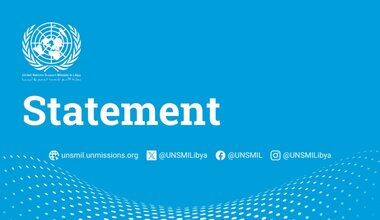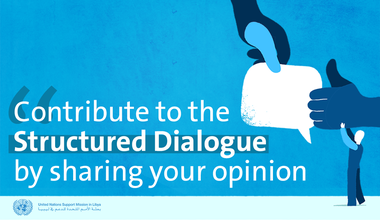Families of missing persons share their aspirations for truth and justice in UN consultations
Tarhuna, Misrata, and Tawergha, Libya — From 6 to 9 October, the United Nations Support Mission in Libya (UNSMIL) and the United Nations Development Programme (UNDP), in cooperation with the General Authority for the Search and Identification of Missing Persons (GASIMP), held three forums with 85 family members of missing persons in Tarhuna, Misrata, and Tawergha.
During the forums, GASIMP representatives outlined the Authority’s mandate and explained the process of searching for missing persons — including exhumations of mass graves, DNA sampling, and the identification of human remains. Families were able to raise questions about their individual cases, helping to strengthen trust and cooperation between them and GASIMP.
“I was afraid to provide DNA,” said one mother in Tarhuna. “Because doing so would be like admitting that my missing son is dead.” She added that she now felt more confident to cooperate, after speaking directly with GASIMP and learning about the data protection measures in place.
Despite significant efforts since 2020, 66 people remain missing in Tarhuna. Rubble covering several mass graves continues to obstruct ongoing exhumation efforts.
By offering a safe space for families to share their needs and concerns, the forums helped deepen understanding of families’ perspectives and aspirations for truth, justice, and reparations. These priorities must be reflected in ongoing transitional justice efforts.
Families also learned about their rights under international and Libyan law and provided their feedback on draft legislation on missing persons developed through the joint UNSMIL/UNDP programme. The proposed legislation aims to simplify reporting procedures, expand access to psychosocial services, and reduce administrative barriers faced by families.
“My husband has been missing for 14 years,” said a woman in Tawergha. “But I still haven’t received a death certificate.” Without it, she explained, she cannot access her husband’s pension or inheritance.
The focus group discussions highlighted the need for critical mental health and psychosocial support, as well as legal aid, and the need for more awareness around victims’ rights.
“Enforced disappearances are a form of torture and ill-treatment that affects entire families,” said Suki Nagra, Director of UNSMIL’s Human Rights Service. “The rights of these families to truth, justice, and reparations should be at the core of any transitional justice process in Libya.” She further called on Libyan authorities to ratify the International Convention on the Protection of All Persons from Enforced Disappearance.
As part of the joint programme, UNSMIL and UNDP will continue engaging with families of missing persons across Libya. Future efforts will support the creation of a national coalition of civil society organizations working on missing persons and advocating for the adoption of the new legislation as well as the strengthening of forensic capacities for exhumation and DNA identification. The programme also seeks to expand access to mental health and psychosocial services for affected families in these target areas.
 United Nations Peacekeeping
United Nations Peacekeeping UN
UN



















